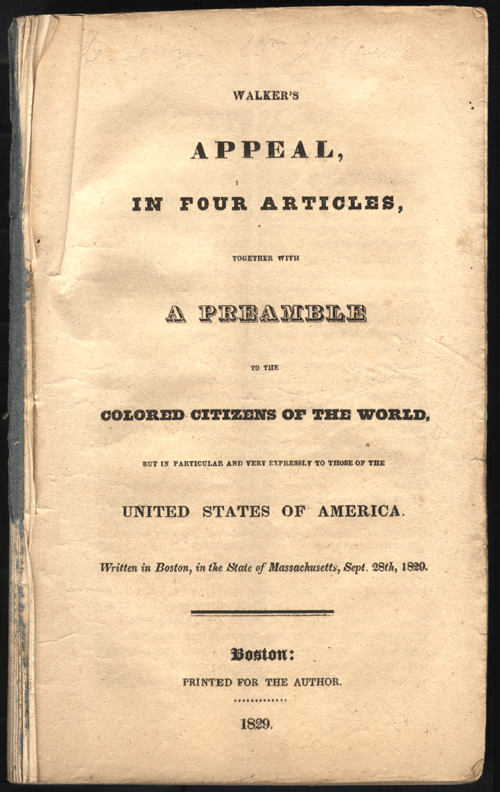”Remember Americans, that we must and shall be free and enlightened as you are, will you wait until we shall, under God, obtain our liberty by the crushing arm of power? Will it not be dreadful for you? I speak Americans for your good. We must and shall be free I say, in spite of you. You may do your best to keep us in wretchedness and misery, to enrich you and your children; but God will deliver us from under you. And wo, wo, will be to you if we have to obtain our freedom by fighting.
David WalkerAppeal to the Colored Citizens of the World
David Walker, a free black man from Boston, wrote to Thomas Lewis in Richmond on 8 December 1829 enclosing thirty copies of the first edition of his pamphlet An Appeal to the Colored Citizens of the World. Walker instructed Lewis to sell the pamphlet for twelve cents among the Richmond’s African-American population or to provide them free of charge. Walker used Old Testament theology and the natural rights philosophy of the Declaration of Independence to describe the plight of African-Americans, both slave and free, in four articles: “Our wretchedness in consequence of slavery,” “Our wretchedness in consequence of ignorance,” “Our wretchedness in consequence of the preachers of the religion of Jesus Christ,” and “Our wretchedness in consequence of the colonizing plan.”
Walker’s Appeal advocated rebellions throughout the South and caused many southern states, including Virginia, to pass laws against slave literacy and the dissemination of anti-slavery literature. Criticized by abolitionist William Lloyd Garrison as too radical, Walker’s publication of the Appeal is considered by some historians as the beginning of the Abolitionist Movement. This pamphlet along with the letter to Thomas Lewis is part of the Office of the Speaker’s Executive Communications collection.
David Walker was born in Wilmington, North Carolina, to a slave father and a free mother around 1796. He relocated to Boston in 1826 where he owned a used clothing shop on Brattle Street. Greatly influenced by his experiences with slavery in the South, Walker served as a member of the Massachusetts General Colored Association and as Boston’s principal agent to the Freedom’s Journal, America’s first African-American newspaper. Walker authored the first edition of Appeal in 1829, along with two further editions by 1830. He distributed his pamphlet throughout the South by sewing copies into the lining of sailors’ clothing. The wide distribution of the pamphlet caused a stir amongst the whites of the South, especially in Georgia, South Carolina, North Carolina, and Virginia. As a result of the discovery of the pamphlets, black sailors were quarantined in Georgia ports, a white mariner was arrested in South Carolina, and a black carpenter was killed in North Carolina.
In Virginia, Walker’s letter to Thomas Lewis was discovered by Joseph Mayo, Commonwealth’s Attorney for the Hustings Court of the City of Richmond, and promptly delivered to Governor William B. Giles. Mayo informed the Governor that Walker’s letter never reached the intended recipient on account of the death of Lewis. Instead, the letter made it to the hands of another freedman who began to circulate the literature. The Mayor of Richmond managed to reacquire twenty of the thirty copies of Walker’s pamphlet. Governor Giles presented Walker’s letter and one of these pamphlets to the Executive Council who advised him to transmit the literature to the Legislature to obtain a law to prevent the further circulation of insurrectionary materials. The Governor’s communication to Linn Banks, Speaker of the House of Delegates, was labeled “confidential” and no mention is made of it in the House Journals, however, the communication’s endorsement indicates that it was laid on the table on 7 January 1830. As a result of Walker’s Appeal, the General Assembly passed an act at their next session to amend the act concerning slaves, free negroes, and mulattoes which prohibited meetings for teaching free negroes or mulattoes and fined any white person for teaching slaves to read or write.
Walker died on 6 August 1830 of consumption, shortly after the publication of the 3rd edition of his pamphlet. Walker never saw his vision of an immediate abolition of slavery, but the impact of the Appeal was far-reaching. In August 1831, Nat Turner led a rebellion against the white slave owners in Southampton County. Although there is no evidence that Turner had knowledge of Walker’s Appeal, the historical significance of the pamphlet is undeniable. Equally important is the letter from Walker to Lewis which remains the only extant document written in the hand of David Walker.
-Craig S. Moore, State Records Appraisal Archivist














Hello … I am currently writing a publication of the health practices of our ancestors i the early phase of post-slavery. I grew up in Virginia in the 40’s/50’s and often traveled the Carolinas. I learned a lot about health through the oral tradition. What I learned has been extremely valuable. Thank you for this article!!!